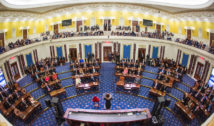
Dangerous Ideas
- By Ash D --
- 17 Nov 2022 --
“Pilate saith unto him, What is truth? And when he had said this, he went out again unto the Jews, and saith unto them, I find in him no fault at all.” —The Bible, John 18:38
In recorded history, there have been countless conflicts between people, groups and nations. There may have been a time when man fought man only for survival, the winner of combat would take the more fertile ground or better watering hole. But, in the annals of man, conflict is rarely simple. The Reformation, the Crusades and the Six-Day War were predicated on a conflict of ideas. Is the resolution of conflict then discrimination against certain ideas? If religion is found to be the subject of argument, even the subject of war, are its ideas dangerous?
The religious scriptures of our civilization have included the Bible, the Quran, the Hadiths, the Torah, the Vedas, the Upanishads, the Agamas, The Seven Valleys, The Four Valleys, the Tipitaka, the Tanakh, Dianetics, the Bhagavad Gita, the Talmud, the Dao De Jing, the Book of Shadows, the Book of Mormon, and the Book of the Dead, to name but a few. Compounded on that is religious interpretation with thousands of religious documentaries, 10s of thousands of books about religion and spirituality, and even more dedicated to the history of religion.
Recently, Kyrie Irving, one of the top 20 players in the NBA today, has been the subject of controversy by promoting a documentary he watched that contains antisemitic tropes and describes the origins of the Black race as starting with the Israelites. Irving denied being antisemitic or intending any harm, but not before this action resulted in his suspension from the Nets. Irving later apologized and pledged to pay $500,000 to groups that fight hate, such as the Anti-Defamation League, while the American Jewish Committee petitioned Amazon to pull the documentary.
There are groups that have succeeded in getting thousands of books, which contain characters that are LGBTQ+, critical race theory, and even the Bible, banned in some American school libraries. Woke groups have had Mark Twain’s seminal work Huckleberry Finn removed from curricula as offensive to Blacks and gotten six titles by Dr. Seuss pulled from publication over racial stereotypes. There are even commercial organizations, which exist as part of a so-called “anti-cult movement,” that profit by using force and duress to make believers renounce their faith and by targeting minority religions with propaganda that culminates in events like the Branch Davidian tragedy in Waco, Texas.
At the state level, China, though officially agnostic as a nation, prohibits any religious materials except for the version authorized by the state; Russia, which has categorized Jehovah’s Witnesses as extremist, confiscates books and imprisons their members; and Saudi Arabia, prohibits proselytizing for any religion besides Islam.
The hardline efforts on both ends of this argument are problematic. Are prominent members of our society allowed to voice their views? Should disparate views be open to discussion?
In 1954, when America was half mad with fear of communism, Edward R. Murrow said, “We must not confuse dissent with disloyalty. We must remember always that accusation is not proof and that conviction depends upon evidence and due process of law. We will not walk in fear, one of another. We will not be driven by fear into an age of unreason, if we dig deep in our history and our doctrine, and remember that we are not descended from fearful men—not from men who feared to write, to speak, to associate, and to defend causes that were, for the moment, unpopular.”



















